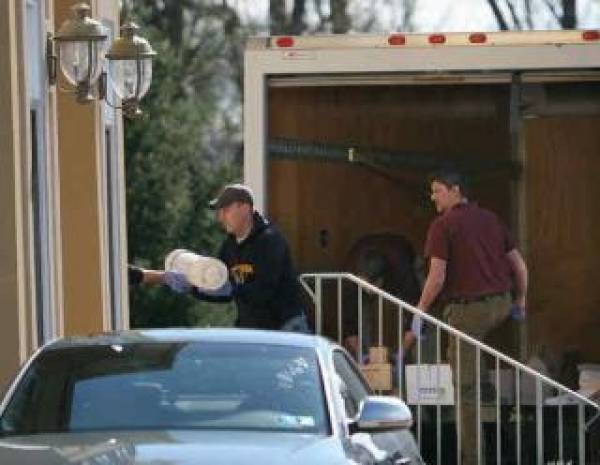Sports betting as Big Business

By George Anastasia
A landscaping crew was out repairing Joseph V. Mastronardo Jr.'s Montgomery County lawn Friday, two days after law enforcement people had ripped it up with shovels and backhoes.
The crew replaced shrubs and plantings and filled in holes, the residue of Wednesday's raid. Sources say investigators seized nearly $1 million found in the home and buried in the yard.
Mastronardo, 60, and his brother and business partner John, 54, were arrested and jailed to await a hearing later this week.
As the crew worked Friday to put things back together, Joseph Mastronardo's son, Joey, 27, stood in the driveway of the villa-like home in the Meadowbrook section of Abington Township. In the three-car garage behind him sat his late-model black Acura and a white Audi.
Asked about the raid and the arrests, the muscular young man in a black T-shirt and tan-and-black Phillies cap rolled his eyes and shrugged.
"I'd really like to help you out," he said, "but my mother's asked me not to say anything."
If the Mastronardos could talk, say people familiar with the case, they might decry a legal system that makes some bets legal and others not, and that they believe singles out Joseph "Joe Vito" Mastronardo Jr. not for what he has done, but for who he is.
He is a bookmaker of almost mythic status who authorities allege has earned millions over the last 30 years providing high-end, well-heeled gamblers with a place to find some action.
His approach was epitomized by one of the dozens of wiretapped conversations made public last week as the investigation unfolded.
"You got to run a straight business," he told an associate. And those who know him say he has been doing just that for decades.
Twenty years ago, the FBI called him one of the "largest sports bookmakers on the East Coast." At that time, state investigators estimated his business grossed $50 million annually.
His acumen was unquestioned in the wagering world. The betting line he set - known as the "Vito line" - was considered the industry gold standard.
While he moved in a world populated by wise guys and wannabes, he had no known ties to the mob - a point underscored Friday by a comment Joey Mastronardo was heard to make as he walked across his property.
"Everybody tries to make it like The Sopranos," he exclaimed.
Joe Vito Mastronardo operated in the suburbs, used Web sites and the Internet, and had a clientele of legitimate customers who wanted nothing to do with gangsters. By all accounts, he never used force, never threatened to hurt someone who was late with a payment. And if a gambler refused to pay, he would simply be cut off, told his action was no longer welcome.
On another tape quoted by investigators in the current case, he complained that an associate who'd threatened a tardy customer was behaving in "a half-a- manner."
Bad for business, Joe Vito warned: The threatened customer would "run to the cops."
For most of his career, he has managed to tap-dance away from the cops - a sweet exception being his father-in-law.
That would be the late Frank L. Rizzo, the tough-talking Philadelphia police captain who rose to become commissioner and then no-nonsense, law-and-order mayor of the city. Rizzo's daughter, Joanna, married Mastronardo in 1978.
Joey Mastronardo, standing in the family's suburban driveway Friday, is the only grandchild of one of Philadelphia's most recognizable political figures.
When Joe Vito's periodic problems with the law are chronicled in newspaper stories and television reports, his famous father-in-law is always mentioned.
The same two Mastronardos who were arrested last week, Joe Vito and his brother John, were convicted of federal gambling charges in 1987. Each spent time in jail.
Four years ago, in a precursor to the current investigation, they were arrested after Montgomery County officials seized $2.7 million linked to their gambling business.
Back then, the Mastronardos cut a deal, pleading guilty to minor charges in exchange for giving up claims to the cash. This time, they might not have that option.
Investigators in the latest case have declined to comment about it. But Dennis J. Cogan, the veteran criminal-defense lawyer who has represented both brothers before, said he expected the case to end up in federal court.
Unlike the investigation in 2006, the ongoing probe includes a strong federal presence. It is, some sources say, part of a wider look into Internet gambling, at operations with hubs offshore and customers scattered up and down the East Coast, and as far west as Chicago and Las Vegas.
The investigators' affidavit made public last week offered snippets of wiretapped conversations in which Joe Vito discussed business, gambling debts, and customers in several of those locales.
A source familiar with the Internet probe said that Mastronardo often served as "banker" for quasi-legitimate offshore-gaming operations, and that some of the money seized last week may be linked to those companies.
That's one reason the latest case could put the Mastronardo brothers in greater legal jeopardy than the last. Another is what happened after that 2006 case.
According to the sworn affidavit of two detectives with the Montgomery County District Attorney's Office, the Mastronardos walked out of court after pleading guilty in 2006 and went right back into the gambling business.
Why? Those who have followed their careers give a simple answer: It's what the Mastronardo brothers do; it's who Joe Vito is.
Over three decades, he built a business around customers like himself - high-rollers who enjoyed the risks, who studied the odds, and who calculated the chances of seeing a return on their investment. They often bet on sports. The Eagles, the Super Bowl, and college basketball are mentioned in the investigators' affidavit. Bets ran up to $10,000 or $20,000, sometimes more.
A longtime associate said last week that Mastronardo "doesn't see this as criminal" - and can go on at length about how laws make what he does a crime, while state lotteries and Nevada sports books take in millions legally.
He understands he's in a risky business, said the associate, but he sees that risk in financial terms. On the tapes, he repeatedly complained about associates who don't keep proper records, about customers who pay late, and about how it all affects his bottom line.
Things, he said again and again, have changed.
"The days of five years ago are not there anymore because of the economy. . . . I mean, I want to get paid for what I do, at least my expenses."
Instead, he said, he was carrying associates, helping them pay expenses, covering their losses. Big-time earners were now big-time losers.
One associate, he said, "if you add up all the money he p-ed away, two million dollars."
That, of course, would be about twice what authorities are said to have found last week in Mastronardo's home and buried in his yard.
And that's in a recession.













